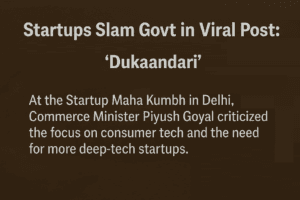Startups Slam Govt in Viral Post: 7 Powerful Reasons Why ‘Dukaandari’ Is Building a New India
At the Startup Maha Kumbh in Delhi, Commerce Minister Piyush Goyal criticized Indian startups for focusing on consumer tech, asking whether the goal was just to do “dukaandari.” In response, Gaonzy co-founder Karan Chawla defended the sector, calling out the government for failing to provide the necessary support for deep-tech innovation. He pointed out the double standards in how large corporations are praised for similar business models that startups are criticized for.
Chawla argued that India’s problem isn’t talent but the lack of patient capital, stable policies, and institutional backing. He highlighted how countries like China built tech giants through strong government support, not just ambition. Despite regulatory hurdles like the Angel Tax and inconsistent policies, Indian startups have created jobs, digitized services, and solved real-life problems. He questioned why India’s large corporations and PSUs haven’t built globally competitive deep-tech products themselves.
Chawla ended by saying this generation is proud to build meaningful businesses and asked whether the system is ready to truly support them.

Startups Slam Govt in Viral Post: 7 Powerful Reasons Why ‘Dukaandari’ Is Building a New India
At the recent Startup Maha Kumbh event in Delhi, India’s Commerce Minister Piyush Goyal sparked a heated discussion by questioning the focus of Indian startups. He criticized their emphasis on consumer-centric businesses like food delivery and e-commerce, likening them to “shopkeeping,” while urging greater investment in deep-tech innovations—areas such as artificial intelligence, semiconductors, and advanced engineering. Goyal expressed concern that India has only about 1,000 deep-tech startups, calling it a “worrying trend” that needs correction.
Entrepreneurs Push Back Against “Double Standards”
Karan Chawla, co-founder of the rural-focused startup Gaonzy, responded sharply on LinkedIn, defending young founders and highlighting systemic gaps. He pointed to a glaring contradiction: when large conglomerates like Reliance enter retail or Tata launches quick-commerce ventures, they’re celebrated as “visionary.” Similarly, when Infosys avoids risks beyond IT services, it’s seen as a prudent strategy. Yet when young entrepreneurs build companies like Zepto (10-minute delivery), Swiggy (food tech), or Flipkart (e-commerce), they’re dismissed as mere “shopkeepers.”
The Real Issue: Systemic Support, Not Ideas
Chawla argued that the problem isn’t a lack of ambition or talent, but a system that fails to nurture innovation. He emphasized that countries like China built global giants such as Huawei (telecom) and BYD (electric vehicles) through aggressive government backing—funding, policy mandates, and domestic market protection. In contrast, Indian startups face hurdles like the Angel Tax (which scrutinizes early-stage investments), unpredictable regulations, and limited access to long-term capital. “Expecting startups to compete globally without fixing these issues is unfair,” he said.
Consumer Tech’s Silent Revolution
While deep-tech garners prestige, Chawla stressed that consumer tech startups drive tangible impact. Platforms like Zomato and Swiggy create millions of jobs, empower small restaurants, and build logistics networks reaching remote areas. Similarly, e-commerce firms help artisans and small businesses access national markets. “Not every innovation needs to be a flashy AI chip. Solving everyday problems—like delivering groceries efficiently—is revolutionary too,” he noted.
Challenging India’s Corporate Giants
Chawla turned the spotlight on India’s established players, asking why homegrown industrial giants haven’t produced globally respected deep-tech innovations. “Where’s India’s Stripe (fintech), Tesla (EVs), or NVIDIA (AI chips)?” he questioned. He also criticized public-sector units and financial institutions for not investing in deep-tech venture funds—unlike countries where state-backed capital fuels R&D.
Policy Hurdles vs. Empty Promises
Despite government initiatives like Startup India, founders still face roadblocks. Frequent policy shifts—such as sudden bans or tax changes—create uncertainty. For instance, the Angel Tax, intended to curb money laundering, ended up harassing genuine startups with audits. Additionally, limited domestic venture capital forces entrepreneurs to rely on foreign investors, who often prioritize markets with stable policies.
A Call for Partnership, Not Criticism
Chawla’s message was clear: young founders are proud of solving real problems, whether through tech platforms or hyperlocal services. Instead of dismissing their work, the system must step up. This includes providing patient capital for deep-tech projects, streamlining regulations, and offering incentives for R&D. He also urged large corporations and public institutions to collaborate with startups rather than viewing them as competitors.
Government’s New Helpline: A Step Forward?
Amid the debate, Goyal announced a startup helpline under the Startup India program, allowing entrepreneurs to report corruption, policy hurdles, or legal challenges. While the initiative is welcomed, many founders remain skeptical, questioning whether it will lead to meaningful reforms or remain symbolic.
The Big Picture
The debate reflects a broader tension in India’s growth story. Consumer tech has democratized services, improved lives, and created economic opportunities. However, for India to compete globally in areas like defense tech, clean energy, or AI, a stronger ecosystem for deep-tech is essential. This requires collaboration—government providing funding and policy stability, corporations mentoring startups, and investors backing long-term bets.
As Chawla summed up, “Building a startup is hard enough. The least the system can do is not stand in the way.” Whether India’s policymakers and institutions rise to this challenge will determine if the next decade belongs to Indian innovation—or missed opportunities.
You must be logged in to post a comment.